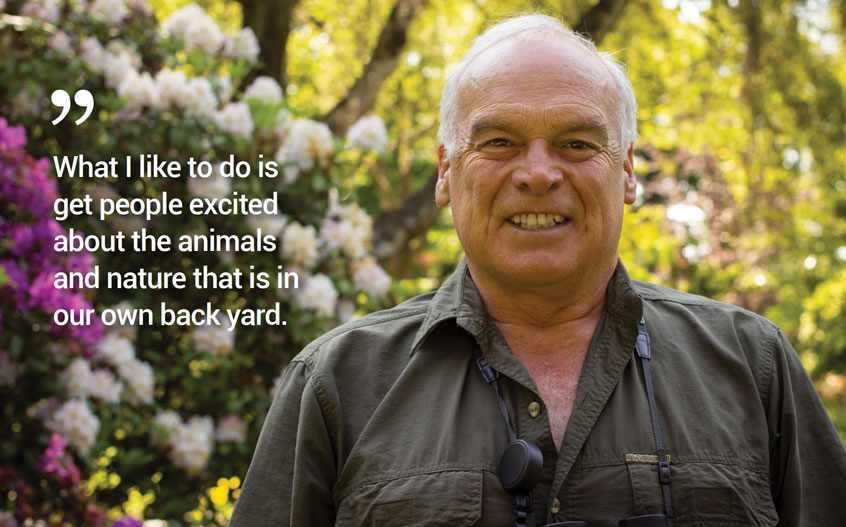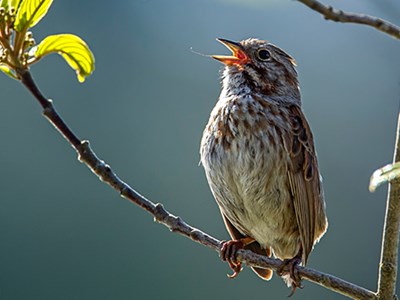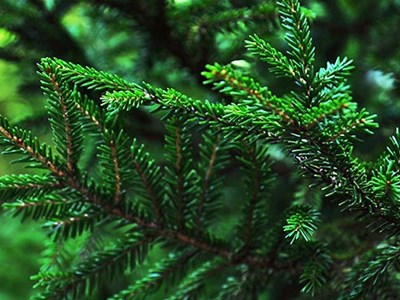Home / Continuing Studies News / Discovery: it's in our nature
Discovery: it's in our nature

with instructor James Clowater
By Therese Eley, Marketing Services
We all grew up with nature shows showing animals from Africa and other countries, but so little do people realize what’s right here," says James Clowater, a lifelong naturalist and longtime instructor with Continuing Studies at UVic. "What I like to do is get people excited about the animals and nature that are in our own back yard."
In 1998, upon returning to Victoria after completing his masters degree at Simon Fraser University, James developed his first course, Marine Birds, for Continuing Studies. "I originally designed it for the tourism industry, so when they didn’t see whales, they could talk about marine birds. I would, at the time, get just about every park naturalist, ranger or eco-tourism worker in Victoria coming to take my course."

But soon enough he noticed his demographic expanding to include lots of regular people who just wanted to know more about the birds and wildlife they were seeing around Victoria. So he started adding additional courses to meet the interests of his students.
 “People get most excited about the songbirds course, where I teach beginners how to listen to birds and learn how to identify them by their song. I have a technique where I help people compartmentalize the kind of sounds that they’re hearing." He explains, "When you’re listening to the dawn chorus in the morning, and there’s so many birds singing all at once, it can be a bit bewildering, but if you learn some skills to separate the different types of songs, then it’s easier to identify them."
“People get most excited about the songbirds course, where I teach beginners how to listen to birds and learn how to identify them by their song. I have a technique where I help people compartmentalize the kind of sounds that they’re hearing." He explains, "When you’re listening to the dawn chorus in the morning, and there’s so many birds singing all at once, it can be a bit bewildering, but if you learn some skills to separate the different types of songs, then it’s easier to identify them."
While James' passion for nature began with solitary adventures as a young boy, it soon grew to be something he enjoyed sharing with others. "As a child, about seven or eight, I remember going out into the bush and spending all day in the woods, building forts and cutting trails, by myself."
"Then as a young man, a naturalist who was learning about all the plants and such, I would share [my knowledge] with anyone who cared to learn. After all, that's how I had first learned, going out with the Natural History Society in Comox."
And he still enjoys it. "Almost every outing something really special happens—I often see something I’ve never seen before. But you have to be open to perceiving what's going
on around you."
He goes on to say, "I don't think people really appreciate the natural environment and they don't understand that without valuing and looking after it, it will be human life that will be endangered. If you don't look after nature, the human race isn't going to survive, and we’re seeing some of those effects now. So my philosophy is, for every person that I can excite about nature, I am doing my part to ensure that both humans and the natural environment will be here for future generations."
 This is why James goes out of his way to explore topics that people just don't know about. His latest personal project, Trees of Victoria has already spawned a new course about the identification of native and exotic conifers in the city.
This is why James goes out of his way to explore topics that people just don't know about. His latest personal project, Trees of Victoria has already spawned a new course about the identification of native and exotic conifers in the city.
"The idea struck me as I was walking around Victoria and I looked up and I saw this tree and I wondered 'what is that?!' because I know it’s not from here. But how do you look that up? Your local field guides won’t have them because trees planted in the urban environment can be from anywhere in the world." So he spends hours scouring through scant resources, photographing characteristics, identifying trees, and compiling it into a web site and database so comprehensive, he's not sure if it will be completed in his lifetime.
"So it is my own interest in learning about nature that leads to producing more courses. I'm retired now but this has allowed me to combine my personal passion with my own learning opportunities and be able to share it with others. It's like my own continuing education."
- Posted December 14, 2021
RELATED TOPICS: Horticulture and Nature
Visit Registration
2nd Floor | Continuing Studies Building University of Victoria Campus 3800 Finnerty Road | Victoria BC | CanadaTel 250-472-4747 | Email uvcsreg@uvic.ca
2026 © Continuing Studies at UVic
Legal Notices |
Sitemap

